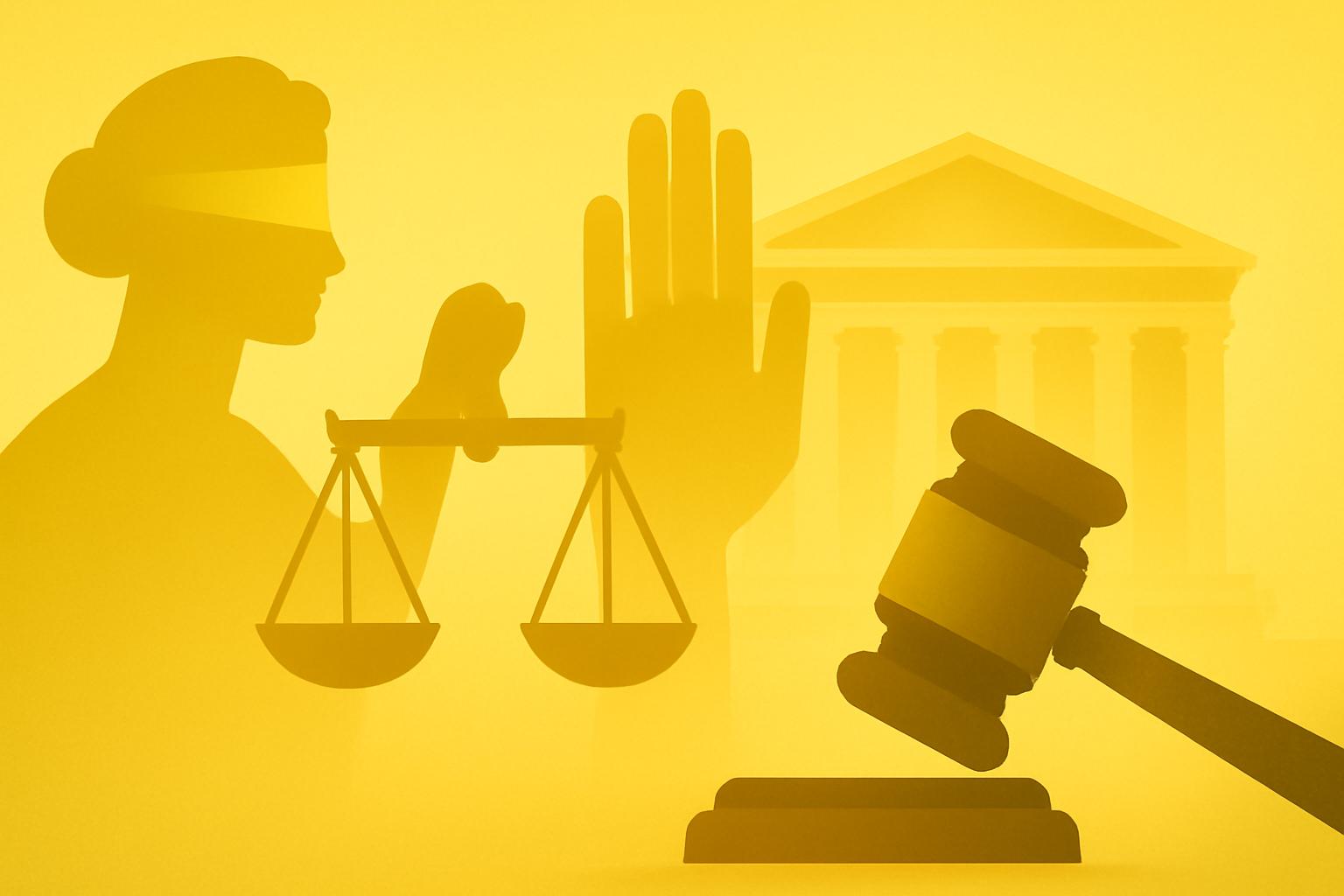The Supreme Court’s refusal to hear Ghislaine Maxwell’s appeal removes a significant legal uncertainty surrounding her conviction and sentence, reaffirming the judiciary’s stance on prosecuting high-profile sex trafficking cases. The decision highlights ongoing tensions between legal processes, political influence, and public expectations for justice. !-- wp:paragraph -->
Contents
FinOracleAI — Market ViewFinOracleAI — Market ViewFinOracleAI — Market ViewFinOracleAI — Market ViewPolitical and Public ResponseFinOracleAI — Market ViewPolitical and Public ResponseFinOracleAI — Market ViewCurrent Status and SentencePolitical and Public ResponseFinOracleAI — Market ViewCurrent Status and SentencePolitical and Public ResponseFinOracleAI — Market ViewLegal Arguments and BackgroundCurrent Status and SentencePolitical and Public ResponseFinOracleAI — Market ViewLegal Arguments and BackgroundCurrent Status and SentencePolitical and Public ResponseFinOracleAI — Market ViewSupreme Court Denies Appeal in Ghislaine Maxwell’s Sex Trafficking CaseLegal Arguments and BackgroundCurrent Status and SentencePolitical and Public ResponseFinOracleAI — Market View
- Opportunities: Reinforces the credibility of federal prosecutions in complex sex trafficking cases involving influential figures.
- Risks: Potential political fallout if executive clemency is granted, especially given Maxwell’s connections to former President Trump.
- Continued public and media scrutiny on prison conditions and transparency related to high-profile inmates.
- Heightened demand for reforms in how non-prosecution agreements are handled in cases involving co-conspirators.
“We are grateful to the Supreme Court for denying Ghislaine Maxwell’s appeal to invalidate her conviction,” the family said. “We remain hopeful that the Department of Justice will realize that she belongs in a maximum security prison, not the country club one she is currently in, the first human trafficker ever to have been afforded that privilege.”FinOracleAI — Market View
The Supreme Court’s refusal to hear Ghislaine Maxwell’s appeal removes a significant legal uncertainty surrounding her conviction and sentence, reaffirming the judiciary’s stance on prosecuting high-profile sex trafficking cases. The decision highlights ongoing tensions between legal processes, political influence, and public expectations for justice. !-- wp:paragraph -->- Opportunities: Reinforces the credibility of federal prosecutions in complex sex trafficking cases involving influential figures.
- Risks: Potential political fallout if executive clemency is granted, especially given Maxwell’s connections to former President Trump.
- Continued public and media scrutiny on prison conditions and transparency related to high-profile inmates.
- Heightened demand for reforms in how non-prosecution agreements are handled in cases involving co-conspirators.
“We’re, of course, deeply disappointed that the Supreme Court declined to hear Ghislaine Maxwell’s case. But this fight isn’t over,” Markus said. “Serious legal and factual issues remain, and we will continue to pursue every avenue available to ensure that justice is done.” Meanwhile, relatives of Virginia Giuffre, one of Maxwell and Epstein’s most prominent accusers, welcomed the Supreme Court’s decision and called for Maxwell to serve her full sentence in a maximum-security prison.
!-- wp:paragraph -->“We are grateful to the Supreme Court for denying Ghislaine Maxwell’s appeal to invalidate her conviction,” the family said. “We remain hopeful that the Department of Justice will realize that she belongs in a maximum security prison, not the country club one she is currently in, the first human trafficker ever to have been afforded that privilege.”FinOracleAI — Market View
The Supreme Court’s refusal to hear Ghislaine Maxwell’s appeal removes a significant legal uncertainty surrounding her conviction and sentence, reaffirming the judiciary’s stance on prosecuting high-profile sex trafficking cases. The decision highlights ongoing tensions between legal processes, political influence, and public expectations for justice. !-- wp:paragraph -->- Opportunities: Reinforces the credibility of federal prosecutions in complex sex trafficking cases involving influential figures.
- Risks: Potential political fallout if executive clemency is granted, especially given Maxwell’s connections to former President Trump.
- Continued public and media scrutiny on prison conditions and transparency related to high-profile inmates.
- Heightened demand for reforms in how non-prosecution agreements are handled in cases involving co-conspirators.
“It’s not something I’ve heard discussed, and we don’t comment on clemency requests that may or may not have been made, but I’m certainly not tracking that one,” said Leavitt. Maxwell’s attorney, David Oscar Markus, expressed disappointment but vowed to continue legal efforts.
!-- wp:paragraph -->“We’re, of course, deeply disappointed that the Supreme Court declined to hear Ghislaine Maxwell’s case. But this fight isn’t over,” Markus said. “Serious legal and factual issues remain, and we will continue to pursue every avenue available to ensure that justice is done.” Meanwhile, relatives of Virginia Giuffre, one of Maxwell and Epstein’s most prominent accusers, welcomed the Supreme Court’s decision and called for Maxwell to serve her full sentence in a maximum-security prison.
!-- wp:paragraph -->“We are grateful to the Supreme Court for denying Ghislaine Maxwell’s appeal to invalidate her conviction,” the family said. “We remain hopeful that the Department of Justice will realize that she belongs in a maximum security prison, not the country club one she is currently in, the first human trafficker ever to have been afforded that privilege.”FinOracleAI — Market View
The Supreme Court’s refusal to hear Ghislaine Maxwell’s appeal removes a significant legal uncertainty surrounding her conviction and sentence, reaffirming the judiciary’s stance on prosecuting high-profile sex trafficking cases. The decision highlights ongoing tensions between legal processes, political influence, and public expectations for justice. !-- wp:paragraph -->- Opportunities: Reinforces the credibility of federal prosecutions in complex sex trafficking cases involving influential figures.
- Risks: Potential political fallout if executive clemency is granted, especially given Maxwell’s connections to former President Trump.
- Continued public and media scrutiny on prison conditions and transparency related to high-profile inmates.
- Heightened demand for reforms in how non-prosecution agreements are handled in cases involving co-conspirators.
“It’s not something I’ve heard discussed, and we don’t comment on clemency requests that may or may not have been made, but I’m certainly not tracking that one,” said Leavitt. Maxwell’s attorney, David Oscar Markus, expressed disappointment but vowed to continue legal efforts.
!-- wp:paragraph -->“We’re, of course, deeply disappointed that the Supreme Court declined to hear Ghislaine Maxwell’s case. But this fight isn’t over,” Markus said. “Serious legal and factual issues remain, and we will continue to pursue every avenue available to ensure that justice is done.” Meanwhile, relatives of Virginia Giuffre, one of Maxwell and Epstein’s most prominent accusers, welcomed the Supreme Court’s decision and called for Maxwell to serve her full sentence in a maximum-security prison.
!-- wp:paragraph -->“We are grateful to the Supreme Court for denying Ghislaine Maxwell’s appeal to invalidate her conviction,” the family said. “We remain hopeful that the Department of Justice will realize that she belongs in a maximum security prison, not the country club one she is currently in, the first human trafficker ever to have been afforded that privilege.”FinOracleAI — Market View
The Supreme Court’s refusal to hear Ghislaine Maxwell’s appeal removes a significant legal uncertainty surrounding her conviction and sentence, reaffirming the judiciary’s stance on prosecuting high-profile sex trafficking cases. The decision highlights ongoing tensions between legal processes, political influence, and public expectations for justice. !-- wp:paragraph -->- Opportunities: Reinforces the credibility of federal prosecutions in complex sex trafficking cases involving influential figures.
- Risks: Potential political fallout if executive clemency is granted, especially given Maxwell’s connections to former President Trump.
- Continued public and media scrutiny on prison conditions and transparency related to high-profile inmates.
- Heightened demand for reforms in how non-prosecution agreements are handled in cases involving co-conspirators.
Political and Public Response
The decision arrives amid scrutiny of the Trump administration’s reluctance to release investigative files related to Epstein and Maxwell, despite earlier commitments to transparency. !-- wp:paragraph --> White House Press Secretary Karoline Leavitt declined to comment on potential clemency, stating that no discussions were known to her and emphasizing that clemency requests are not publicly tracked. !-- wp:paragraph -->“It’s not something I’ve heard discussed, and we don’t comment on clemency requests that may or may not have been made, but I’m certainly not tracking that one,” said Leavitt. Maxwell’s attorney, David Oscar Markus, expressed disappointment but vowed to continue legal efforts.
!-- wp:paragraph -->“We’re, of course, deeply disappointed that the Supreme Court declined to hear Ghislaine Maxwell’s case. But this fight isn’t over,” Markus said. “Serious legal and factual issues remain, and we will continue to pursue every avenue available to ensure that justice is done.” Meanwhile, relatives of Virginia Giuffre, one of Maxwell and Epstein’s most prominent accusers, welcomed the Supreme Court’s decision and called for Maxwell to serve her full sentence in a maximum-security prison.
!-- wp:paragraph -->“We are grateful to the Supreme Court for denying Ghislaine Maxwell’s appeal to invalidate her conviction,” the family said. “We remain hopeful that the Department of Justice will realize that she belongs in a maximum security prison, not the country club one she is currently in, the first human trafficker ever to have been afforded that privilege.”FinOracleAI — Market View
The Supreme Court’s refusal to hear Ghislaine Maxwell’s appeal removes a significant legal uncertainty surrounding her conviction and sentence, reaffirming the judiciary’s stance on prosecuting high-profile sex trafficking cases. The decision highlights ongoing tensions between legal processes, political influence, and public expectations for justice. !-- wp:paragraph -->- Opportunities: Reinforces the credibility of federal prosecutions in complex sex trafficking cases involving influential figures.
- Risks: Potential political fallout if executive clemency is granted, especially given Maxwell’s connections to former President Trump.
- Continued public and media scrutiny on prison conditions and transparency related to high-profile inmates.
- Heightened demand for reforms in how non-prosecution agreements are handled in cases involving co-conspirators.
Political and Public Response
The decision arrives amid scrutiny of the Trump administration’s reluctance to release investigative files related to Epstein and Maxwell, despite earlier commitments to transparency. !-- wp:paragraph --> White House Press Secretary Karoline Leavitt declined to comment on potential clemency, stating that no discussions were known to her and emphasizing that clemency requests are not publicly tracked. !-- wp:paragraph -->“It’s not something I’ve heard discussed, and we don’t comment on clemency requests that may or may not have been made, but I’m certainly not tracking that one,” said Leavitt. Maxwell’s attorney, David Oscar Markus, expressed disappointment but vowed to continue legal efforts.
!-- wp:paragraph -->“We’re, of course, deeply disappointed that the Supreme Court declined to hear Ghislaine Maxwell’s case. But this fight isn’t over,” Markus said. “Serious legal and factual issues remain, and we will continue to pursue every avenue available to ensure that justice is done.” Meanwhile, relatives of Virginia Giuffre, one of Maxwell and Epstein’s most prominent accusers, welcomed the Supreme Court’s decision and called for Maxwell to serve her full sentence in a maximum-security prison.
!-- wp:paragraph -->“We are grateful to the Supreme Court for denying Ghislaine Maxwell’s appeal to invalidate her conviction,” the family said. “We remain hopeful that the Department of Justice will realize that she belongs in a maximum security prison, not the country club one she is currently in, the first human trafficker ever to have been afforded that privilege.”FinOracleAI — Market View
The Supreme Court’s refusal to hear Ghislaine Maxwell’s appeal removes a significant legal uncertainty surrounding her conviction and sentence, reaffirming the judiciary’s stance on prosecuting high-profile sex trafficking cases. The decision highlights ongoing tensions between legal processes, political influence, and public expectations for justice. !-- wp:paragraph -->- Opportunities: Reinforces the credibility of federal prosecutions in complex sex trafficking cases involving influential figures.
- Risks: Potential political fallout if executive clemency is granted, especially given Maxwell’s connections to former President Trump.
- Continued public and media scrutiny on prison conditions and transparency related to high-profile inmates.
- Heightened demand for reforms in how non-prosecution agreements are handled in cases involving co-conspirators.
Current Status and Sentence
Maxwell, 63, was convicted in 2022, three years after Epstein’s death by suicide in federal custody. She is presently incarcerated in a minimum-security facility in Texas, a move that stirred controversy given her status as a convicted sex offender. !-- wp:paragraph --> Her transfer from a higher-security prison in Florida followed a two-day interview with Deputy U.S. Attorney General Todd Blanche, who previously served as Donald Trump’s criminal defense lawyer. Bureau of Prisons policy ordinarily restricts such transfers for sex offenders without special waivers. !-- wp:paragraph -->Political and Public Response
The decision arrives amid scrutiny of the Trump administration’s reluctance to release investigative files related to Epstein and Maxwell, despite earlier commitments to transparency. !-- wp:paragraph --> White House Press Secretary Karoline Leavitt declined to comment on potential clemency, stating that no discussions were known to her and emphasizing that clemency requests are not publicly tracked. !-- wp:paragraph -->“It’s not something I’ve heard discussed, and we don’t comment on clemency requests that may or may not have been made, but I’m certainly not tracking that one,” said Leavitt. Maxwell’s attorney, David Oscar Markus, expressed disappointment but vowed to continue legal efforts.
!-- wp:paragraph -->“We’re, of course, deeply disappointed that the Supreme Court declined to hear Ghislaine Maxwell’s case. But this fight isn’t over,” Markus said. “Serious legal and factual issues remain, and we will continue to pursue every avenue available to ensure that justice is done.” Meanwhile, relatives of Virginia Giuffre, one of Maxwell and Epstein’s most prominent accusers, welcomed the Supreme Court’s decision and called for Maxwell to serve her full sentence in a maximum-security prison.
!-- wp:paragraph -->“We are grateful to the Supreme Court for denying Ghislaine Maxwell’s appeal to invalidate her conviction,” the family said. “We remain hopeful that the Department of Justice will realize that she belongs in a maximum security prison, not the country club one she is currently in, the first human trafficker ever to have been afforded that privilege.”FinOracleAI — Market View
The Supreme Court’s refusal to hear Ghislaine Maxwell’s appeal removes a significant legal uncertainty surrounding her conviction and sentence, reaffirming the judiciary’s stance on prosecuting high-profile sex trafficking cases. The decision highlights ongoing tensions between legal processes, political influence, and public expectations for justice. !-- wp:paragraph -->- Opportunities: Reinforces the credibility of federal prosecutions in complex sex trafficking cases involving influential figures.
- Risks: Potential political fallout if executive clemency is granted, especially given Maxwell’s connections to former President Trump.
- Continued public and media scrutiny on prison conditions and transparency related to high-profile inmates.
- Heightened demand for reforms in how non-prosecution agreements are handled in cases involving co-conspirators.
Current Status and Sentence
Maxwell, 63, was convicted in 2022, three years after Epstein’s death by suicide in federal custody. She is presently incarcerated in a minimum-security facility in Texas, a move that stirred controversy given her status as a convicted sex offender. !-- wp:paragraph --> Her transfer from a higher-security prison in Florida followed a two-day interview with Deputy U.S. Attorney General Todd Blanche, who previously served as Donald Trump’s criminal defense lawyer. Bureau of Prisons policy ordinarily restricts such transfers for sex offenders without special waivers. !-- wp:paragraph -->Political and Public Response
The decision arrives amid scrutiny of the Trump administration’s reluctance to release investigative files related to Epstein and Maxwell, despite earlier commitments to transparency. !-- wp:paragraph --> White House Press Secretary Karoline Leavitt declined to comment on potential clemency, stating that no discussions were known to her and emphasizing that clemency requests are not publicly tracked. !-- wp:paragraph -->“It’s not something I’ve heard discussed, and we don’t comment on clemency requests that may or may not have been made, but I’m certainly not tracking that one,” said Leavitt. Maxwell’s attorney, David Oscar Markus, expressed disappointment but vowed to continue legal efforts.
!-- wp:paragraph -->“We’re, of course, deeply disappointed that the Supreme Court declined to hear Ghislaine Maxwell’s case. But this fight isn’t over,” Markus said. “Serious legal and factual issues remain, and we will continue to pursue every avenue available to ensure that justice is done.” Meanwhile, relatives of Virginia Giuffre, one of Maxwell and Epstein’s most prominent accusers, welcomed the Supreme Court’s decision and called for Maxwell to serve her full sentence in a maximum-security prison.
!-- wp:paragraph -->“We are grateful to the Supreme Court for denying Ghislaine Maxwell’s appeal to invalidate her conviction,” the family said. “We remain hopeful that the Department of Justice will realize that she belongs in a maximum security prison, not the country club one she is currently in, the first human trafficker ever to have been afforded that privilege.”FinOracleAI — Market View
The Supreme Court’s refusal to hear Ghislaine Maxwell’s appeal removes a significant legal uncertainty surrounding her conviction and sentence, reaffirming the judiciary’s stance on prosecuting high-profile sex trafficking cases. The decision highlights ongoing tensions between legal processes, political influence, and public expectations for justice. !-- wp:paragraph -->- Opportunities: Reinforces the credibility of federal prosecutions in complex sex trafficking cases involving influential figures.
- Risks: Potential political fallout if executive clemency is granted, especially given Maxwell’s connections to former President Trump.
- Continued public and media scrutiny on prison conditions and transparency related to high-profile inmates.
- Heightened demand for reforms in how non-prosecution agreements are handled in cases involving co-conspirators.
Legal Arguments and Background
Maxwell’s defense argued that she should not have faced prosecution at all due to a 2008 non-prosecution agreement secured by Epstein from the U.S. Attorney’s Office for the Southern District of Florida. That agreement, they claimed, protected any potential co-conspirators from federal charges. !-- wp:paragraph --> Epstein had pleaded guilty to Florida state charges related to procuring minors for prostitution under the terms of that agreement. Maxwell’s attorneys contended that this should have shielded her from federal prosecution in New York. !-- wp:paragraph -->Current Status and Sentence
Maxwell, 63, was convicted in 2022, three years after Epstein’s death by suicide in federal custody. She is presently incarcerated in a minimum-security facility in Texas, a move that stirred controversy given her status as a convicted sex offender. !-- wp:paragraph --> Her transfer from a higher-security prison in Florida followed a two-day interview with Deputy U.S. Attorney General Todd Blanche, who previously served as Donald Trump’s criminal defense lawyer. Bureau of Prisons policy ordinarily restricts such transfers for sex offenders without special waivers. !-- wp:paragraph -->Political and Public Response
The decision arrives amid scrutiny of the Trump administration’s reluctance to release investigative files related to Epstein and Maxwell, despite earlier commitments to transparency. !-- wp:paragraph --> White House Press Secretary Karoline Leavitt declined to comment on potential clemency, stating that no discussions were known to her and emphasizing that clemency requests are not publicly tracked. !-- wp:paragraph -->“It’s not something I’ve heard discussed, and we don’t comment on clemency requests that may or may not have been made, but I’m certainly not tracking that one,” said Leavitt. Maxwell’s attorney, David Oscar Markus, expressed disappointment but vowed to continue legal efforts.
!-- wp:paragraph -->“We’re, of course, deeply disappointed that the Supreme Court declined to hear Ghislaine Maxwell’s case. But this fight isn’t over,” Markus said. “Serious legal and factual issues remain, and we will continue to pursue every avenue available to ensure that justice is done.” Meanwhile, relatives of Virginia Giuffre, one of Maxwell and Epstein’s most prominent accusers, welcomed the Supreme Court’s decision and called for Maxwell to serve her full sentence in a maximum-security prison.
!-- wp:paragraph -->“We are grateful to the Supreme Court for denying Ghislaine Maxwell’s appeal to invalidate her conviction,” the family said. “We remain hopeful that the Department of Justice will realize that she belongs in a maximum security prison, not the country club one she is currently in, the first human trafficker ever to have been afforded that privilege.”FinOracleAI — Market View
The Supreme Court’s refusal to hear Ghislaine Maxwell’s appeal removes a significant legal uncertainty surrounding her conviction and sentence, reaffirming the judiciary’s stance on prosecuting high-profile sex trafficking cases. The decision highlights ongoing tensions between legal processes, political influence, and public expectations for justice. !-- wp:paragraph -->- Opportunities: Reinforces the credibility of federal prosecutions in complex sex trafficking cases involving influential figures.
- Risks: Potential political fallout if executive clemency is granted, especially given Maxwell’s connections to former President Trump.
- Continued public and media scrutiny on prison conditions and transparency related to high-profile inmates.
- Heightened demand for reforms in how non-prosecution agreements are handled in cases involving co-conspirators.
Legal Arguments and Background
Maxwell’s defense argued that she should not have faced prosecution at all due to a 2008 non-prosecution agreement secured by Epstein from the U.S. Attorney’s Office for the Southern District of Florida. That agreement, they claimed, protected any potential co-conspirators from federal charges. !-- wp:paragraph --> Epstein had pleaded guilty to Florida state charges related to procuring minors for prostitution under the terms of that agreement. Maxwell’s attorneys contended that this should have shielded her from federal prosecution in New York. !-- wp:paragraph -->Current Status and Sentence
Maxwell, 63, was convicted in 2022, three years after Epstein’s death by suicide in federal custody. She is presently incarcerated in a minimum-security facility in Texas, a move that stirred controversy given her status as a convicted sex offender. !-- wp:paragraph --> Her transfer from a higher-security prison in Florida followed a two-day interview with Deputy U.S. Attorney General Todd Blanche, who previously served as Donald Trump’s criminal defense lawyer. Bureau of Prisons policy ordinarily restricts such transfers for sex offenders without special waivers. !-- wp:paragraph -->Political and Public Response
The decision arrives amid scrutiny of the Trump administration’s reluctance to release investigative files related to Epstein and Maxwell, despite earlier commitments to transparency. !-- wp:paragraph --> White House Press Secretary Karoline Leavitt declined to comment on potential clemency, stating that no discussions were known to her and emphasizing that clemency requests are not publicly tracked. !-- wp:paragraph -->“It’s not something I’ve heard discussed, and we don’t comment on clemency requests that may or may not have been made, but I’m certainly not tracking that one,” said Leavitt. Maxwell’s attorney, David Oscar Markus, expressed disappointment but vowed to continue legal efforts.
!-- wp:paragraph -->“We’re, of course, deeply disappointed that the Supreme Court declined to hear Ghislaine Maxwell’s case. But this fight isn’t over,” Markus said. “Serious legal and factual issues remain, and we will continue to pursue every avenue available to ensure that justice is done.” Meanwhile, relatives of Virginia Giuffre, one of Maxwell and Epstein’s most prominent accusers, welcomed the Supreme Court’s decision and called for Maxwell to serve her full sentence in a maximum-security prison.
!-- wp:paragraph -->“We are grateful to the Supreme Court for denying Ghislaine Maxwell’s appeal to invalidate her conviction,” the family said. “We remain hopeful that the Department of Justice will realize that she belongs in a maximum security prison, not the country club one she is currently in, the first human trafficker ever to have been afforded that privilege.”FinOracleAI — Market View
The Supreme Court’s refusal to hear Ghislaine Maxwell’s appeal removes a significant legal uncertainty surrounding her conviction and sentence, reaffirming the judiciary’s stance on prosecuting high-profile sex trafficking cases. The decision highlights ongoing tensions between legal processes, political influence, and public expectations for justice. !-- wp:paragraph -->- Opportunities: Reinforces the credibility of federal prosecutions in complex sex trafficking cases involving influential figures.
- Risks: Potential political fallout if executive clemency is granted, especially given Maxwell’s connections to former President Trump.
- Continued public and media scrutiny on prison conditions and transparency related to high-profile inmates.
- Heightened demand for reforms in how non-prosecution agreements are handled in cases involving co-conspirators.
Supreme Court Denies Appeal in Ghislaine Maxwell’s Sex Trafficking Case
The United States Supreme Court on Monday declined to hear the appeal of Ghislaine Maxwell, the former British socialite convicted for her role in the sex trafficking of underage girls in connection with Jeffrey Epstein. Maxwell is currently serving a 20-year prison sentence following her 2022 federal conviction in Manhattan. !-- wp:paragraph --> The Court’s refusal effectively ends Maxwell’s judicial options for early release, leaving a potential path only through executive clemency. The justices did not disclose how many, if any, were in favor of reviewing the case. !-- wp:paragraph -->Legal Arguments and Background
Maxwell’s defense argued that she should not have faced prosecution at all due to a 2008 non-prosecution agreement secured by Epstein from the U.S. Attorney’s Office for the Southern District of Florida. That agreement, they claimed, protected any potential co-conspirators from federal charges. !-- wp:paragraph --> Epstein had pleaded guilty to Florida state charges related to procuring minors for prostitution under the terms of that agreement. Maxwell’s attorneys contended that this should have shielded her from federal prosecution in New York. !-- wp:paragraph -->Current Status and Sentence
Maxwell, 63, was convicted in 2022, three years after Epstein’s death by suicide in federal custody. She is presently incarcerated in a minimum-security facility in Texas, a move that stirred controversy given her status as a convicted sex offender. !-- wp:paragraph --> Her transfer from a higher-security prison in Florida followed a two-day interview with Deputy U.S. Attorney General Todd Blanche, who previously served as Donald Trump’s criminal defense lawyer. Bureau of Prisons policy ordinarily restricts such transfers for sex offenders without special waivers. !-- wp:paragraph -->Political and Public Response
The decision arrives amid scrutiny of the Trump administration’s reluctance to release investigative files related to Epstein and Maxwell, despite earlier commitments to transparency. !-- wp:paragraph --> White House Press Secretary Karoline Leavitt declined to comment on potential clemency, stating that no discussions were known to her and emphasizing that clemency requests are not publicly tracked. !-- wp:paragraph -->“It’s not something I’ve heard discussed, and we don’t comment on clemency requests that may or may not have been made, but I’m certainly not tracking that one,” said Leavitt. Maxwell’s attorney, David Oscar Markus, expressed disappointment but vowed to continue legal efforts.
!-- wp:paragraph -->“We’re, of course, deeply disappointed that the Supreme Court declined to hear Ghislaine Maxwell’s case. But this fight isn’t over,” Markus said. “Serious legal and factual issues remain, and we will continue to pursue every avenue available to ensure that justice is done.” Meanwhile, relatives of Virginia Giuffre, one of Maxwell and Epstein’s most prominent accusers, welcomed the Supreme Court’s decision and called for Maxwell to serve her full sentence in a maximum-security prison.
!-- wp:paragraph -->“We are grateful to the Supreme Court for denying Ghislaine Maxwell’s appeal to invalidate her conviction,” the family said. “We remain hopeful that the Department of Justice will realize that she belongs in a maximum security prison, not the country club one she is currently in, the first human trafficker ever to have been afforded that privilege.”FinOracleAI — Market View
The Supreme Court’s refusal to hear Ghislaine Maxwell’s appeal removes a significant legal uncertainty surrounding her conviction and sentence, reaffirming the judiciary’s stance on prosecuting high-profile sex trafficking cases. The decision highlights ongoing tensions between legal processes, political influence, and public expectations for justice. !-- wp:paragraph -->- Opportunities: Reinforces the credibility of federal prosecutions in complex sex trafficking cases involving influential figures.
- Risks: Potential political fallout if executive clemency is granted, especially given Maxwell’s connections to former President Trump.
- Continued public and media scrutiny on prison conditions and transparency related to high-profile inmates.
- Heightened demand for reforms in how non-prosecution agreements are handled in cases involving co-conspirators.













